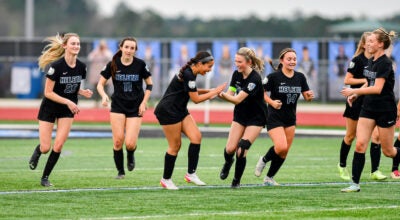Homeschoolers seek right to play at public school
Published 10:01 pm Monday, March 30, 2009
Thousands of homeschooled students, parents and supporters will gather at the State House in Montgomery Wednesday morning in the name of Tim Tebow.
For the fourth year, the Tim Tebow Act, or Senate Bill 305, sits before the Alabama Senate education committee to allow homeschoolers the chance to try out for athletics and other extracurricular activities at their local public high school.
Many Shelby County residents plan to be a part of the discussion at Wednesday’s public hearing, which will begin at 8 a.m. in the Star Wars Room on the third floor of the State House.
“One of us will be there,” said Pelham resident Dave Squires, speaking of himself and his wife Lisa. “We’re not the type of family at the moment that knows everything we need to know about the Tim Tebow Bill. We’re just finding out now and trying to get involved.”
The Squires homeschool their five children, who share interests in baseball, football, track, soccer and band.
Now that the oldest are approaching middle school age, Dave said he is asked by coaches every year if they will enroll their sons in public school to allow them to continue playing ball. The Squires prefer homeschooling, so they’ve considered moving to a state with equal access. Moving, however, isn’t a real option to them.
They’re waiting on the Senate to pass the bill.
“It would mean everything,” Dave said. “We’d have the best of both worlds. We’d love to keep homeschooling, but also have the chance to play competive sports.”
Some homeschoolers have decided to enroll in public school in order to play, such as Chelsea soccer player Hobson Roberts.
“Homeschoolers shouldn’t be punished,” Roberts said. “One of the reasons that they weren’t going to pass it before is people thought homeschoolers would be taking the spots of their children, and I think by all means we wouldn’t be taking anybody’s spot, we’ll be filling in the ones that need to be filled. We don’t have an abundance of athletes.”
Sen. Hank Erwin (R – Montevallo), a former homeschool parent and sponsor of the bill, is not sure the bill will pass this year.
“The senate education committee is stacked with AEA backed senators and the AEA is adamantly opposed to homeschoolers playing in public schools,” Erwin said. “Our hope is that we can make some progress this year and get it in play so that we can change the make up of the senate in 2010 to push it through.”
If that’s the case, then junior Madison Smith, zoned for Chelsea, will not get the chance he’d like to have to close his high school career on the Chelsea track team.
Smith set the state record in the half mile at the Alabama Christian Education Association state track meet last spring and would like the chance to run at Chelsea High as a senior.
While his record time of 2:12.18 would not be a state championship time for Chelsea, it would have been a Top 20 time in last year’s Class 5A state championship, as would his 4:52 mile.
“As a homeschool student and a citizen of Alabama, I feel like I have a right to play just like anybody else,” said Madison,
But if the bill does not clear committee this year, Smith said he’ll still support it.
“I would love for it to pass this year, but its not just for me. I have a couple of young siblings who have lots of potential to be even better than I am, and I also have tons of friends who are excelling at regional and national levels who could use this to their benefit,” Smith said.
If Smith or his siblings were able to play, they’d play at Chelsea High, where principal Jay Peoples said he would do whatever he needs to do to uphold what the legislature decides.
“I can see both sides of the issue,” Peoples said. “If they decide to let them play, we’re going to seek clarification and try to educate ourselves about the policy.”
Peoples said currently the school’s athletic director and coaches help monitor eligibility of players, and admits that because the students would not be enrolled at Chelsea, that it might create a small burden on the school to check eligibility.
“We would have to work particularly close and depend highly on their home school organization,” Peoples said. “I do want to make it clear though, that there would be no antagonism or antipathy on my part if the legislature were to allow them to participate.”
The bill would allow home educated children the chance to try out for a team at a school they are zoned for, if they meet all eligibility requirements and pay any necessary fees.
NATIONAL ATTENTION
Since breaking onto the college football scene as a national champion in 2005, Tim Tebow’s stardom has helped spread the equal access cause across the nation.
Twenty-four states currently have equal access legislation, while 13 other states are working on legislation.
After Erwin first modeled the bill after Florida’s legislation in 2006, the bill was featured on ESPN’s “Outside the Lines.” Arkansas and Kentucky both have entered legislation that share Tebow’s name and model the Florida bill in recent years, with Kentucky joining the movement this January.
“I think that not only is equal access the main issue, but I think the bigger picture is for the state of Alabama, which is not traditionally a very progressive state educationally,” said Nancy Smith, Madison’s mother. “The (states with equal access) are very progressive states academically, and apparently its’ working for them. I think it would be one more benefit for this state to be associated with more academically oriented states to create a bridge between public school parents and children and homeschool parents and children.”









